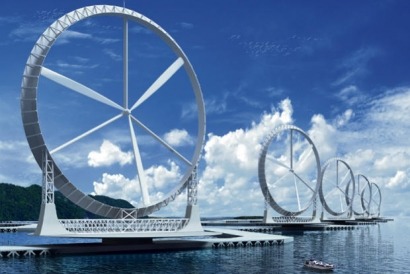
The conference entitled REvision 2012: “Toward a New Energy Paradigm after 3/11” was sponsored by the Japan Renewable Energy Foundation (JREF) and other international partner organizations. The basic mission of JREF is to create a sustainable energy society based on renewable energy through policy and social innovation. JREF has recently established an “innovation network” of distinguished members from Japan and over 20 other countries to share innovative ideas about a transition to renewable energy in Japan.
During the conference opening, the Vice Minister of Environment of Japan, Katsuhiko Yokomitsu, told the audience that, “the safety myth of nuclear power has collapsed.” Masayoshi Son, founder and chairperson of JREF, told the audience that before the 11 March tragedy, he used to believe that nuclear power was safe, stable, and inexpensive, but now he understands that belief was wrong.
Members of the JREF innovation network encourage the Japanese people to continue and accelerate the path to completely phase out nuclear power and embrace a new energy system entirely from renewable energy. The members learned from Japanese experts of the many barriers to such a path. These barriers mostly concern the poor state of energy policy-making in Japan and the monopoly structure of the energy system, which together with rigid centralized decision-making prevent the changes and innovations that have already taken place in most OECD countries over the past 30 years.
Members note that Japan was once a leader in renewable energy, but has lost that leadership to many countries as diverse as China, Germany, and Iceland. Members call for Japan to regain that leadership, which they believe is completely possible. Japan has a strong history of innovation and can become a leader in efficiently integrating renewable energy. Many renewable energy solutions can be implemented very quickly, even in a matter of months, and could make large contributions to a nuclear phase-out. But these solutions require restructuring of energy system governance and the electric power market – including “unbundling” of the utility system and competitive markets to lower costs. “A paradigm change is clearly necessary,” noted Tomas Käberger, chairman of the JREF executive board.
Members believe that stronger renewable energy targets for Japan are essential. The current provisional target of 10% share of energy by 2020 is not enough, and compares with Europe’s target of 20% in the same time frame. Members acknowledge that some unique conditions do exist in Japan, including higher costs of wind and solar power compared with other countries. But such conditions arise partly from complicated regulation and uncompetitive markets that need overhaul.
Finally, members note the importance of community-power solutions at local levels, and that many cities and communities across Japan are already taking actions towards more decentralized and locally owned energy.
Videos of the event are available on the JREF website.
[Inset: Courtesy of Yuji Ohya. Artist's impressions of Wind Lens turbines being developed by the Kyushu University in Japan]
For additional information:

